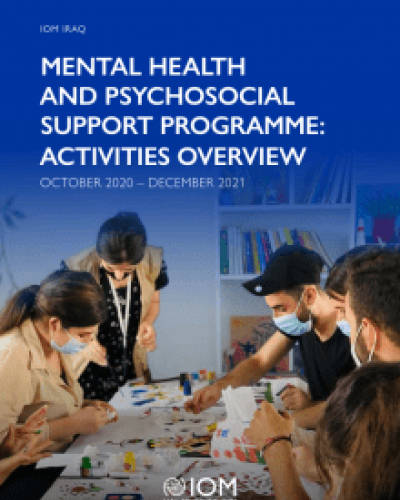IOM Iraq: Mental Health and Psychosocial Support Programme: Activities Overview

Iraq has witnessed multiple waves of conflict and violence that greatly affected millions of Iraqis for a prolonged period of time. For many individuals, this has led to a multitude of stressors and challenges that are often difficult to cope with.
Experiencing a disruption of social networks, lack of community support, distressful personal events, human rights violations, discrimination, harsh living conditions during displacement, loss of property, and uncertainty about the future are common stressors that have a negative impact among people affected by conflict.
The IOM Mental Health and Psychosocial Support (MHPSS) programme aims to improve the psychological and social well-being and strengthen the overall resilience of individuals affected by conflict. Implemented through different levels of the Inter-Agency Standing Committee’s (IASC) pyramid of intervention, IOM implements a range of MHPSS activities that supports internally displaced persons (IDPs), returnees, and host communities to regain a sense of safety and human security, increase self and community efficacy, encourage the creation or reactivation of social networks, and develop tools for affected communities to deal with the past and regain hope in the future.
Under a larger community stabilization objective, the MHPSS programme was implemented in close collaboration with other social cohesion and protection activities.
IOM began supporting psychosocial activities in Iraq in 2010, with more comprehensive MHPSS programming implemented from 2014 onwards. The programmed aimed to address the MHPSS needs in Iraq originating throughout several adverse political and humanitarian situations. The programme is now shifting more towards stabilization and recovery activities, with some of the humanitarian work to address the protracted needs of Iraq, IOM’s MHPSS programme has also worked on integrating its activities into other programming such as livelihoods to ensure a cohesive, sustainable approach.
From October 2020 until the end of 2021, IOM’s MHPSS programme was active in 10 governorates across the country. All IOM services were tailored to the needs of the recipients depending on their phase of displacement and their location, in or out of camps, and in areas of return. To ensure optimal reach, MHPSS services was offered both in community centres and through mobile teams, including outreach visits in both modalities.
All IOM MHPSS services were carried out in a manner consistent with the ‘do no harm’ principle outlined in the Sphere project, WHO’s definition of mental health, and the IASC Guidelines on Mental Health and Psychosocial Support Services in Emergency Settings. Beneficiaries receive comprehensive services adapted to their needs, including:
-
Specialized services
-
Focused non-specialized services
-
Community and family support
-
Social considerations in basic services
Girls, boys, women, men, youth, persons with disabilities, survivors of sexual violence and torture, elderly, orphans and other groups received age and cultural appropriate support through a variety of services. In each site, groups and individuals with vulnerabilities were identified to create an individualized plan for them.
In order to provide sustainable solutions and increase the impact of interventions, IOM continued to promote awareness on mental health throughout Iraq, aiming to reduce the stigma associated with it among the population and engaging civil society in MHPSS activities. To further support sustainability, capacity building for IOM workers, staff members of the Iraqi Government, NGOs and civil society organizations (CSOs) is a key pillar of the programme.





